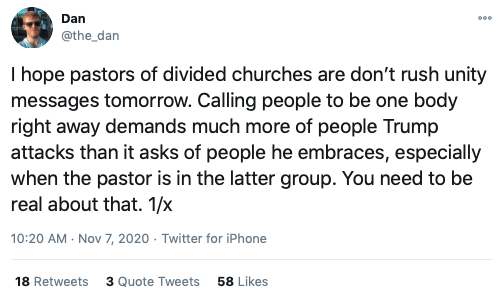On Saturday, in many major U.S. cities, as people danced and cars honked and liquor stores sold out of champagne, thousands of pastors started writing and re-writing their sermons for the next day: the Sunday after a historic and bitter election.
In the days leading up to Nov. 3, PRRI published polling data showing that 86 percent of Americans were concerned that there would be widespread violent protests in the aftermath of the election. And moreover, 84 percent of Americans agreed that religious leaders should help spread peace — that they should “de-escalate anger before it turns violent.”
In President-elect Joe Biden’s acceptance speech on Saturday he “pledge[d] to be a president who seeks not to divide, but to unify. Who doesn’t see red and blue states, but a United States.”
Yet over the weekend, some social media users used their platforms to warn pastors not to conflate peace-building and unity with forced reconciliation. Dan Nejfelt tweeted that "calling people to be one body right away demands much more of people Trump attacks than it asks of people he embraces."
Rev. Kaji Douša preached similar words to Manhattan’s Park Avenue Christian Church: “In this divided country, it’s no surprise that there are already calls to bypass justice," she said. "... There will be no unity, there will be no reckoning, until justice is served.”
Across the country in San Diego, the Revs. Laurel and Colin Matthewson also echoed this sentiment to their St. Luke’s North Park congregation:
“It seems easy to pray for unity, but scripture and experience tell us we need God's help to seek a unity that is holy and not idolatrous. The unity we desire doesn’t erase those on the margins or those who are different but instead holds every member as essential, like we strive for in the church.”
Other pastors urged their parishioners not to bypass justice or joy, as they processed the election results. Rev. Jacqui Lewis of New York's Middle Collegiate Church, declared that the Sunday after the election was “a day of celebration.” “I’m gonna celebrate that when George Floyd cried out for his mama, mamas answered,” she preached.
Of course, not all mothers answered. Lewis acknowledged the pain of knowing that millions of people voted for four more years of Donald Trump. “Though we are rejoicing today — and I am partying with the best of us — we’re just not finished,” she said. “We’re not finished until we understand that we are really actually inextricably connected one to the other. That when a child in Appalachia is hungry, my stomach growls. That when a child in Detroit still doesn’t have clean water to drink, you’re thirsty. That when a queer couple is harassed just for being in love with one another, that all of us feel heartbroken.”
Similarly, in Washington, D.C., Rev. Maria Swearingen of Calvary Baptist invited her community to take a moment to celebrate before returning to the long and ongoing fight for justice:
“I want you to hear today that it is biblical to have a moment. It is holy, it is sacred, it is good; it is essential to the soul’s wellbeing to have a moment,” she said. “There will be plenty to say about how white Christians were completely unsurprising — again. But friends, beloved ones, we must let our bodies and our spirits have this moment. The Abuser-in-Chief has violated our imagination, our hopes, our very lives for four years, and he doesn’t get to do it anymore."
But as preliminary exit polling has begun to show, most voting American Christians don’t see Biden’s victory as “freeing.” Approximately two-thirds of voters who identify as Christian cast their ballots for Trump.
Rev. Cameron Barr of United Church of Chapel Hill, N.C., shared with his congregation that the closeness of this election pained him. “I was really hoping for a definitive and overwhelming rejection of the cruelty and inhumanity that has characterized our national leadership in the past four years,” he said in his sermon. “I wanted more than anything a landslide that said Trumpism is not who we are … [But] the truth is that Trumpism is a little bit of who we are. The cruelty and inhumanity of the past four years is part of our national story.”
Many faith leaders who Sojourners interviewed in the wake of the election expressed that pastors are called to be storytellers and truth-tellers. Rev. Jes Kast and Rev. Amy Lunde-Whitler wrote in a comment to Sojourners that pastors must “listen to the deep stories of all people” as they “lead the church in doing the hard work of loving one another — which means telling the truth about who we are … ”
And who we could become. Pastor John Garland of San Antonio Mennonite Church turned to the book of Ezekiel to show how we might “live in joy and justice” when it seems like our “national heart is a stone.”
“The news, the threats, the exhaustion, the hopeless meanness will yank at our spirits, but we hold fast to the vision of dry bones getting flesh, and then being filled by the life-breath of God,” he said in his sermon. “We can keep on, together in this long journey home, knowing the breath of God is coming from every direction.”
Got something to say about what you're reading? We value your feedback!






